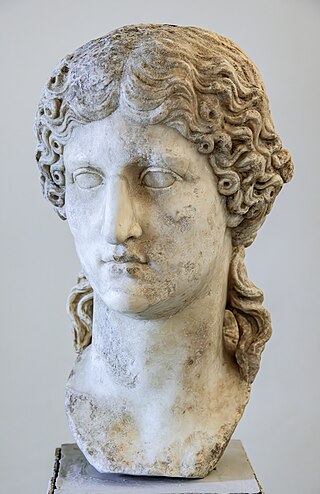
(Vipsania) Agrippina the Elder was a prominent member of the Julio-Claudian dynasty. She was the daughter of Marcus Vipsanius Agrippa and Augustus' daughter, Julia the Elder. Her brothers Lucius and Gaius Caesar were the adoptive sons of Augustus, and were his heirs until their deaths in AD 2 and 4, respectively. Following their deaths, her second cousin Germanicus was made the adoptive son of Tiberius, Augustus' stepson, as part of the succession scheme in the adoptions of AD 4. As a result of the adoption, Agrippina was wed to Germanicus in order to bring him closer to the Julian family.

Julia Agrippina, also referred to as Agrippina the Younger, was Roman empress from AD 49 to 54, the fourth wife and niece of emperor Claudius, and the mother of Nero.
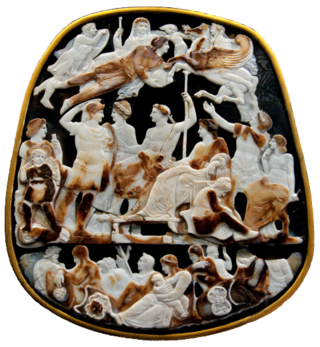
The Julio-Claudian dynasty comprised the first five Roman emperors: Augustus, Tiberius, Caligula, Claudius, and Nero.

Around the start of the Common Era, the family trees of the gens Julia and the gens Claudia became intertwined into the Julio-Claudian family tree as a result of marriages and adoptions.
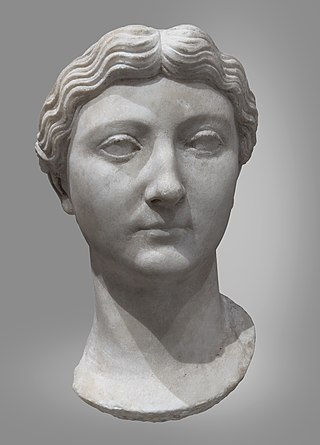
Livia Drusilla was Roman empress from 27 BC to AD 14 as the wife of emperor Augustus. She was known as Julia Augusta after her formal adoption into the Julian family in AD 14.
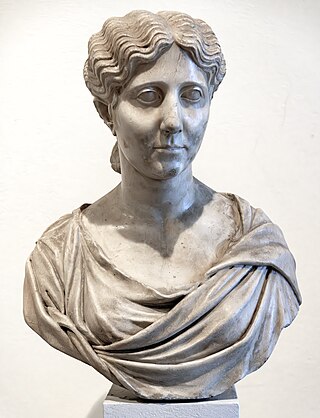
Antonia Minor was the younger of two surviving daughters of Mark Antony and Octavia Minor. She was a niece of the Emperor Augustus, sister-in-law of the Emperor Tiberius, paternal grandmother of the Emperor Caligula and Empress Agrippina the Younger, mother of the Emperor Claudius, and maternal great-grandmother of the Emperor Nero. She outlived her husband Drusus, her oldest son, her daughter, and several of her grandchildren.

Gaius Caesar was a grandson and heir to the throne of Roman emperor Augustus, alongside his younger brother Lucius Caesar. Although he was born to Marcus Vipsanius Agrippa and Julia, Augustus' only daughter, Gaius and Lucius were raised by their grandfather as his adopted sons and joint-heirs. He experienced an accelerated political career befitting a member of the Julio-Claudian dynasty, with the Roman Senate allowing him to advance his career without first holding a quaestorship or praetorship, offices that ordinary senators were required to hold as part of the cursus honorum.

Vipsania Agrippina was the first wife of the Emperor Tiberius. She was the daughter of Marcus Vipsanius Agrippa and Attica, thus being a granddaughter of Titus Pomponius Atticus, the best friend of Cicero.

Lucius Caesar was a grandson of Augustus, the first Roman emperor. The son of Marcus Vipsanius Agrippa and Julia the Elder, Augustus' only daughter, Lucius was adopted by his grandfather along with his older brother, Gaius Caesar. As the emperor's adopted sons and joint-heirs to the Roman Empire, Lucius and Gaius had promising political and military careers. However, Lucius died of a sudden illness on 20 August 2 AD, in Massilia, Gaul, while traveling to meet the Roman army in Hispania. His brother Gaius also died at a relatively young age on 21 February 4 AD. The untimely loss of both heirs compelled Augustus to redraw the line of succession by adopting Lucius' younger brother, Agrippa Postumus as well as his stepson, Tiberius on 26 June 4 AD.
Iullus Antonius was a Roman magnate and poet. A son of Mark Antony and Fulvia, he was spared by the emperor Augustus after the civil wars of the Republic, and was married to the emperor's niece. He was later condemned as one of the lovers of Augustus's daughter, Julia, and killed himself.
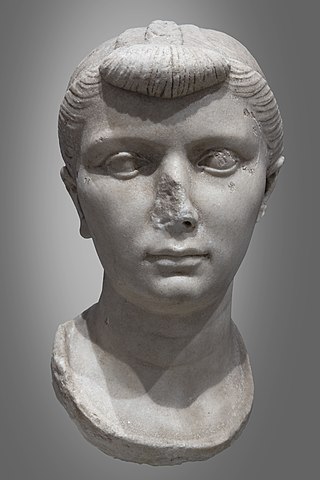
Julia the Elder, known to her contemporaries as Julia Caesaris filia or Julia Augusti filia, was the daughter and only biological child of Augustus, the first Roman emperor, and his second wife, Scribonia. Julia was also stepsister and second wife of the Emperor Tiberius; maternal grandmother of the Emperor Caligula and the Empress Agrippina the Younger; grandmother-in-law of the Emperor Claudius; and maternal great-grandmother of the Emperor Nero. Her epithet "the Elder" distinguishes her from her daughter, Julia the Younger.

Marcus Claudius Marcellus was the eldest son of Gaius Claudius Marcellus and Octavia Minor, sister of Augustus. He was Augustus' nephew and closest male relative, and began to enjoy an accelerated political career as a result. He was educated with his cousin Tiberius and traveled with him to Hispania where they served under Augustus in the Cantabrian Wars. In 25 BC he returned to Rome where he married his cousin Julia, who was the emperor's daughter. Marcellus and Augustus' general Marcus Vipsanius Agrippa were the two popular choices as heir to the empire. According to Suetonius, this put Agrippa at odds with Marcellus, and is the reason why Agrippa traveled away from Rome to Mytilene in 23 BC.

Octavia the Younger was the elder sister of the first Roman emperor, Augustus, the half-sister of Octavia the Elder, and the fourth wife of Mark Antony. She was also the great-grandmother of the Emperor Caligula and Empress Agrippina the Younger, maternal grandmother of the Emperor Claudius, and paternal great-grandmother and maternal great-great-grandmother of the Emperor Nero.

The Julii Caesares were the most illustrious family of the patrician gens Julia. The family first appears in history during the Second Punic War, when Sextus Julius Caesar was praetor in Sicily. His son, Sextus Julius Caesar, obtained the consulship in 157 BC; but the most famous descendant of this stirps is Gaius Julius Caesar, a general who conquered Gaul and became the undisputed master of Rome following the Civil War. Having been granted dictatorial power by the Roman Senate and instituting a number of political and social reforms, he was assassinated in 44 BC. After overcoming several rivals, Caesar's adopted son and heir, Gaius Julius Caesar Octavianus, was proclaimed Augustus by the senate, inaugurating what became the Julio-Claudian line of Roman emperors.
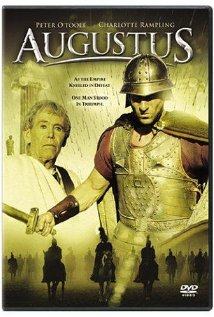
Imperium: Augustus is a 2003 joint British-Italian production, and part of the Imperium series. It tells of the life story of Octavian and how he became Augustus. Half the film takes place in the past and the other half takes place in the later life of Augustus.

Jeg elsket Tiberius is a 1959 romance novel by Elisabeth Dored. It was first translated into English by Naomi Walford in Great Britain by Methuen and United States by Pantheon Books in 1963 under the name I Loved Tiberius. The novel was written as a careful reappraisal of the contemporary sources, placing Julia and Tiberius in a more positive light. The novel is set in 1st century BC Rome, centred on Julia the Elder, the daughter of Augustus and her life right up until her death. The novel begins with Julia's birth and her mother being forbidden to see her. The plot is mainly focused on Julia's love life, notably her relationship with her stepbrother, Tiberius.
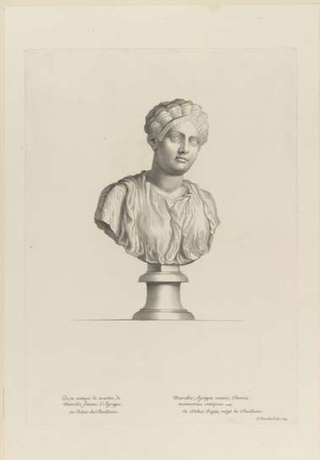
Claudia Marcella Major (PIR2 C 1102; born some time before 40 BC) was the senior niece of Roman emperor Augustus, being the eldest daughter of his sister Octavia the Younger and her first husband Gaius Claudius Marcellus. She became the second wife of Augustus' foremost general Marcus Vipsanius Agrippa and after that the wife of Iullus Antonius, the son of Mark Antony.

I, Claudius is a 1976 BBC Television adaptation of Robert Graves' 1934 novel I, Claudius and its 1935 sequel Claudius the God. Written by Jack Pulman, it stars Derek Jacobi as Claudius, with Siân Phillips, Brian Blessed, George Baker, Margaret Tyzack, John Hurt, Patricia Quinn, Ian Ogilvy, Kevin McNally, Patrick Stewart and John Rhys-Davies. The series covers the history of the early Roman Empire, told from the perspective of the elderly Emperor Claudius who narrates the series.
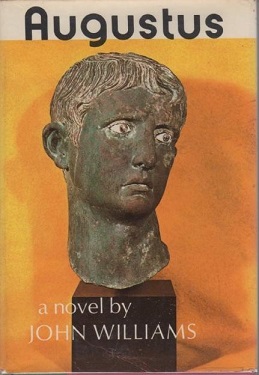
Augustus is an epistolary, historical fiction by John Williams published by Viking Press in 1972. It tells the story of Augustus, emperor of Rome, from his youth through old age. The book is divided into two parts, the beginning chronicling his rise to power, the latter describing his rule thereafter, and the familial problems faced choosing a successor. Williams and Augustus shared the 1973 U.S. National Book Award for Fiction with John Barth and Chimera, the first time the award was split, and the only one of Williams's four novels to receive significant acclaim within his lifetime.


















